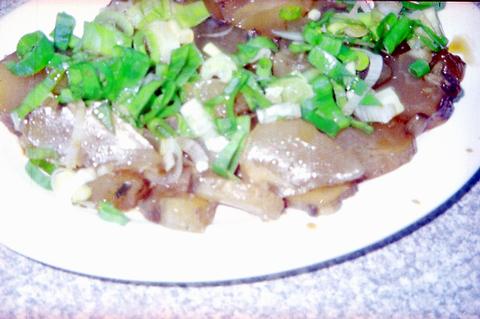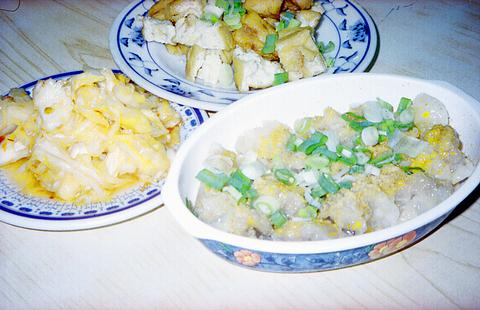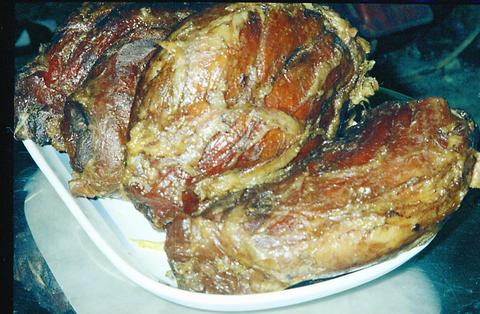Lin Tung-fang Beef Noodle (林東芳牛肉麵)
274, Pa-te Road, Sec. 2 (八德路二段274號), tel: 2752-2556.

PHOTO: YU SEN-LUN
Open 11am to 3am. Average meal: NT$150, no English menu, credit cards not accepted.

PHOTO: YU SEN-LUN
Walking into this small store, you have to cross an unfinished gutter and muscle your way through a narrow row of customers gulping down noodles to sit on a stool about the size of the typical playing card. Beside you may be a huge barrel of beef soup which the store's staff occasionally comes to ladle into another big bucket. But you will dismiss these minor discomforts, because seeing so many people cram into this street-side store even at 3am informs you that the food here is exceptionally good.

PHOTO: YU SEN-LUN
It's a beef specialty store, so ordering beef noodle soup is an obvious choice. Unlike many beef noodle stores that use beef breast or sirloin in their beef noodles, Lin Ting-fang uses beef parts full of tendon. A main difference in this cut of beef is it contains a lot of gelatin and adds tenderness to the meat.
"Some beef breast meat has a harder taste texture, but tendon meat is never like that. It's always soft," said owner Lin Tung-fang (林東芳), who is the second-generation owner of this 30-year-old store. Lin added that because their beef is first stewed and then sliced, " the sweet taste of the meat is finely preserved."
Adding chili is a must for beef noodles and at Lin Tung-fang, the chili oil is another phenomena. On each table is a tin cup that contains a dark red substance. According to Lin, it is the store's original chili oil derived from beef oil extracted from the beef stew and then stir fried with chili oil and red pepper.
Other recommendations of the store include side dishes like beef stomach, beef gelatin and beef intestine.
A-san Shan-tou Beef Noodle (阿三汕頭牛肉麵)
286, Pa-te Road, Sec. 2, (八德路二段286號), tel: 8772-2935.
Open 11am to 3am. Average meal: NT$150, no English menu, credit cards not accepted.
This is probably the most spacious noodle shop on Pa-te road. It's relatively new, having opened about six months ago, but its flavors are never amateur.
Lin Wen-tu (林文土), owner of the store, confided that his shop is an offshoot of neighboring Lin Tung-fang Beef Noodle. "We were originally the big family of beef noodles. After my grandmother, the original inventor of our beef noodles, passed away last year, some things happened and my uncle decided to have his own store," Lin's nephew explained.
So on this small strip of Pa-te Road a family feud is being played out over the rightful claimant of Lin family beef noodle orthodoxy. According to Lin Wen-tu, his beef soup originates from the grandmother's recipe, whereas Lin Ting-fang's beef soup is a variation. "Old customers who prefer the original taste come to our store," said Lin Wen-tu.
The meat, gelatin and beef stomach taste nearly the same as at Lin Tung-fang, but Lin Wen-tu especially recommends his beef gelatin, which is stewed for five hours and then cooled and refrigerated. This process ensures the gelatin's crispness while retaining its flavor. Another recommended side dish is Hua-kan (花干), a fried bean curd stewed in beef soup.
It is not easy to compare the two Lin family stores. But A-san, the less crowded of the two, has one disconnected attraction. Celebrities including DPP Chairman Frank Hsieh (謝長廷), Wubai (伍佰) and Tsui Hark (徐克) have all signed their names on the wall of the store.
Wang's Noodle House (王家麵館)
273, Pa-te Road, Sec. 2, (八德路二段273號), tel: 2731-9148.
Open 10am to 3am (closed every other Sunday). Average meal: NT$120, no English menu, credit cards not accepted.
For those less into meat but very much into the texture of noodles, Wang's Noodle House will serve your need. This shop has established a name for itself with the distinct taste of its noodles.
Ta-lu noodle (大滷麵) is a must when you visit Wang's. It's a bowl of abundant ingredients: stewed pork slices, carrot slices, mushrooms, day lily, bamboo shoots and egg shreds. With so many elements and thickened with starch, the soup is as rich as gravy. It's hard to believe a bowl only costs NT$70. Despite the price and the soup, the true magic of the house lies in its northern Chinese rich, thick handmade noodles.
Owner Wang Mu-jen hails originally from outlying Matsu Island (馬祖). Thirty years ago a veteran from China taught Wang and his wife how to make hand-pulled noodles. They then opened a small noodle stall to serve the soldiers on the island. Ten years later the Wangs brought their shop to Taiwan proper.
Apart from their famed ta-lu noodles, the Wang's restaurant is also known for its cha-chian noodles (炸醬麵) and red chili dumplings (紅油抄手). Cha-chian noodles are dry with a rich, homemade pork sauce. Red chili dumplings are seasoned with chili oil, peanut powder, chopped green onion, and a bit of sugar. For a vegetable dish, try the cabbage pickled in a mixture of vinegar, sugar, rice wine and chili. It helps wash down the slight greasiness of a big bowl of noodles.

In the March 9 edition of the Taipei Times a piece by Ninon Godefroy ran with the headine “The quiet, gentle rhythm of Taiwan.” It started with the line “Taiwan is a small, humble place. There is no Eiffel Tower, no pyramids — no singular attraction that draws the world’s attention.” I laughed out loud at that. This was out of no disrespect for the author or the piece, which made some interesting analogies and good points about how both Din Tai Fung’s and Taiwan Semiconductor Manufacturing Co’s (TSMC, 台積電) meticulous attention to detail and quality are not quite up to

April 21 to April 27 Hsieh Er’s (謝娥) political fortunes were rising fast after she got out of jail and joined the Chinese Nationalist Party (KMT) in December 1945. Not only did she hold key positions in various committees, she was elected the only woman on the Taipei City Council and headed to Nanjing in 1946 as the sole Taiwanese female representative to the National Constituent Assembly. With the support of first lady Soong May-ling (宋美齡), she started the Taipei Women’s Association and Taiwan Provincial Women’s Association, where she

Chinese Nationalist Party (KMT) Chairman Eric Chu (朱立倫) hatched a bold plan to charge forward and seize the initiative when he held a protest in front of the Taipei City Prosecutors’ Office. Though risky, because illegal, its success would help tackle at least six problems facing both himself and the KMT. What he did not see coming was Taipei Mayor Chiang Wan-an (將萬安) tripping him up out of the gate. In spite of Chu being the most consequential and successful KMT chairman since the early 2010s — arguably saving the party from financial ruin and restoring its electoral viability —

It is one of the more remarkable facts of Taiwan history that it was never occupied or claimed by any of the numerous kingdoms of southern China — Han or otherwise — that lay just across the water from it. None of their brilliant ministers ever discovered that Taiwan was a “core interest” of the state whose annexation was “inevitable.” As Paul Kua notes in an excellent monograph laying out how the Portuguese gave Taiwan the name “Formosa,” the first Europeans to express an interest in occupying Taiwan were the Spanish. Tonio Andrade in his seminal work, How Taiwan Became Chinese,